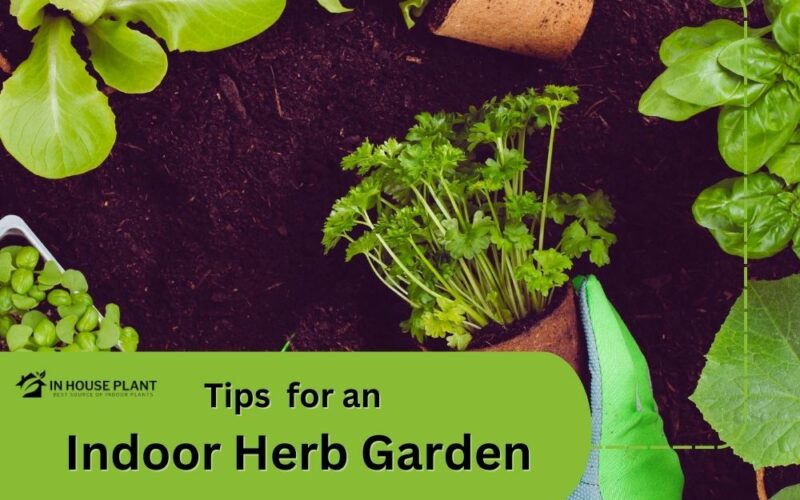If you searching tested and scientifically supported tips for an indoor herb garden, join me in this post to share with you my knowledge and experiences in creating indoor gardens.
- What are the best conditions for growing my herbs indoors?
- How do I keep my herb plants alive indoors in winter?
- How do I set up an indoor herb garden in pot?
- Do indoor herb gardens need drainage?
And many other questions that people often ask me about their indoor herb garden. I’m a horticultural consoler (I have a PhD in plant protection science). In this post, based on my experiences, I collected top 5 golden tips for an indoor herb garden creating and maintaining that will help you to be a successful beginner. Let’s get going.
You can also hear the audio version of this article.
Golden Tips for an Indoor Herb Garden

Every plant has its specific needs. Several ideas for an indoor herb garden from windowsill herb gardens to wall gardens. Some people like create their indoor herb garden in soil but others prefer hydroponic indoor herb gardens. No matter you choose which manner, you must consider your herb requirements to care for them best.
Based on my experiences, I provide you with 10 golden tips that are critical in your success. However, if you have any specific problem with your indoor herb garden, pleas tell me about it below this page, I will help you.
The First Tips for an Indoor Herb Garden: I Find a Suitable Location in my House
For finding the best place for your indoor garden, you must consider several factors. When I counsel people about creating their indoor herb garden, they often discussed with me about appealing factors, but a withered herb garden never increases the beauty of your house.
It is critical the location of your indoor herb garden can provide sufficient light and temperature for herbs. In addition, some herbs such as Dill hate of a compact pot and needs large containers. Let’s discussed these factors in detail.
-
Light is Vital Factor for Having a Healthy Herb Garden
I put it on top of my list because among the tips for an indoor herb garden, Light is critical. Most of people complain: “Basil is recommended for indoor herb garden, but I never successfully grow it indoors for over several months. Why?”, “Why my indoor Cilantro plants have a few leaves with tall and leggy stems?” “Why My indoor Parsley plants don’t have flavorful leaves?”.
Based my experiences, most herbs require at least 4-6 hours of sunlight per day. So, if you have limited budget, you must choose a light location in your house. Where? The brightest place in your house is located near a south-facing window where your herbs can receive adequate sunlight.
If natural light in your house is limited, the only way is using artificial grow lights to supplement the lighting needs of your plants. don’t worry, I discussed the best cheap grow lights for seedlings in my other post. If you have enough budget to choose different brands and types, my other article about the best under cabinet grow light for herb will helpful.
-
I Choose a Place with Right Temperature
Some herbs such as Basil and Rosemary like warm conditions while others like chives prefer colder conditions. hence, it is important to consider the distance between your indoor herb garden and the heaters.
-
I Think about the sizes
As I mentioned above, some herbs such as Dill, Rosemary and Chamomile don’t thrive well in small pots or compact indoor herb gardens. If you want to put them in your list, consider a location in your house with enough space (along with regard to light).
The Second Tip: I Try to Choose the Right Herbs

After consider the space you have available and the amount of light your indoor space receives, it’s time to choose right herbs for your indoor herb garden. Basil, Parsley, Chives, Mint, Thyme, Rosemary, and Cilantro are my favorite herbs for my indoor garden. How about you?
Consider their specific needs. Specially if you want to have an indoor herb jungle (a long container with different herb), you must choose herbs with similar caring requirements. I give to my clients a table and want to fill it (They say Filling it is fun for them or find it an informatic entertainment for their children).
I will chick their table myself to ensure about the correctly of collected information and remind them some points. I put it below, you can print it and fill it before creating your indoor herb garden. after filling it you will have a clear map.
The Third Tips: Watering Is A doable-edged Sword for my Indoor Herb Garden
Most people before gaining counseling lose their indoor herb garden due to overwatering, and after counselling, their indoor herb garden get withed due underwatering!!!! They often complain: “What is a Water appropriately?”
It is more confusing for herbs such as Basil That like wet soils but rot from soggy soils. How we must deal with it? Allow to guide you. For to be success in water appropriately, three factors work together:
- ➡ Watering manner
- ➡ Potting soil mixture,
- ➡ Pot drainage holes.
About the watering manner: It is right that each herb has specific water requirements and you must research the needs of your particular herbs, determining the best time for watering is very easy: do it only when the top inch of soil feels dry to the touch.
The Fourth Tip: Heavy Soil Is a Common Problem of Most Indoor Herb Gardens

To prevent root rot, the herbs in your indoor garden needs a well-draining soil. for having a high-quality potting mix, you can buy it or create your DIY well-draining soil for your indoor herb garden by adding perlite and vermiculite to potting soil. They will create proper drainage in soil.
The Final Tip: I Check the Drainage Holes of my Planter
I to provide proper drainage in my herb pots by creating several drainage holes at the bottom. They allow excess water to escape and the roots never sit in standing water. however, some people love planting in pots without holes.
They have several reasons for using cachepots from appealing views to protect table from pots’ damages due to draining water. if you a fan of pots without holes, before creating your indoor herb garden, please read the below articles:
- Herbs that don’t need drainage holes
- How to plants In Ceramic pots without drainage holes?
- Best practice for watering in pots without drainage
- How to prevent root rot in pots without drainage holes.
Conclusion
I tried to share with you my experiences in creating and maintaining an indoor herb garden. I told you tips for an indoor herb garden based on the most frequent problems that my clients have been involved with them and tried to show you points to fix them.
I hope this post be useful, you can improve it by sharing your problems, ideas and experiences. Please feel free to ask me your questions, it would be my pleasure to help you.

Elahe Rabiei
Hi, I’m Elaheh. My Academic major is plant protection, and houseplants are my expertise. As a houseplant lover, my house is full of indoor plants and it is my passion to take care of them. Hence, I’m here to share my knowledge and experience about growing healthy houseplants. I am also a plant protection advisor, so feel free to ask me any questions you may have.

